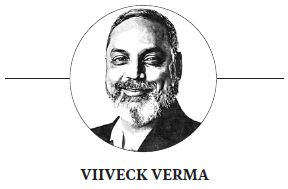Opinion: From Page to Play
Audiobooks and podcasts are more than just entertainment, they are value-additive part and parcel of everyday life

By Viiveck Verma
Our days are divided by relentless schedules and constant multitasking, leaving traditional reading methods no time or space. For the modern adult, in between juggling deadlines, commuting and personal commitments, finding time to wind down with a book is often impossible. That’s where audiobooks and podcasts have reshaped the landscape of information consumption, offering a dynamic alternative to reading. These formats have not only revolutionised how we “read” but have also tailored themselves to the demands of different demographics in this fastpaced world.
From Niche to Mainstream
Once a niche market primarily associated with physical CDs and tapes, audiobooks have emerged as a giant in the digital age. The global audiobook industry was valued at approximately $6.83 billion in 2023, with projections estimated to rise above $35 billion by 2032. This growth is no accident. The perfect confluence of changing consumer habits alongside technological advancements has made audiobooks more accessible than ever before.
The origins of audiobooks can be traced back to the 1930s when the American Foundation for the Blind first introduced them as talking books for the visually impaired. Fast forward to the present, audiobooks have evolved into a mainstream entertainment and learning medium. A study by the Audiobook Publishers Association, US, states that audiobook sales alone reached $1.8 billion in 2022, marking an 8% year-on-year increase. A significant driver behind this surge is the use of smartphones and the rise of audiobook platforms like Audible, Google Play Books and Apple Books.
These formats have not only revolutionised how we ‘read’ but have also tailored themselves to the demands of different demographics
Another crucial driver behind the popularity of audiobooks is convenience. With people constantly on the move, audiobooks offer a way to ‘read’ while commuting, exercising, or doing household chores. Additionally, audiobooks provide access to those who may find traditional reading challenging, like individuals with dyslexia or vision impairments. Audiobooks are also drawing more attention for ways in which they add a new dimension to plain reading. For instance, award-winning narrators such as Bahni Turpin and Wil Wheaton bring literature to life in ways that extend beyond the printed page. In 2023, Barack Obama’s A Promised Land was one of the best-selling audiobooks, because of the unique value of hearing the author’s own voice narrating his story, creating a more intimate connection between the listener and the writer.
Podcasts
While audiobooks offer long-form content that turns traditional reading experiences into auditory ones, podcasts have emerged as a short-form, episodic medium designed for more rapid consumption. With over 5 million podcasts available globally as of 2024 across various platforms, including Spotify, Apple Podcasts and Google Podcasts, podcasting has exploded into a cultural phenomenon.
Edison Research states that more than 464 million people globally were regular podcast listeners in 2023. In the US alone, 42% of adults tuned into podcasts frequently. An endearing comedy and crime series, Only Murders in The Building developed 3 seasons of its show revolving around podcast enthusiasts! What sets podcasts apart is their diversity. From investigative journalism, historical deep dives and health advice to fictional series and interviews with industry experts, one can create a podcast on absolutely anything. Shows like Serial, How I Built This, and The Daily have compelling narratives and expert storytelling, attracting millions of listeners worldwide.
One of the main drivers of this podcast boom is its accessibility. Producing a podcast requires minimal investment, allowing individuals and organisations to share their expertise, opinions and stories without the need for gatekeepers. This has allowed marginalised voices to reach global audiences. Shows like 1619 from The New York Times and Code Switch from NPR have explored issues of race and identity in America, engaging listeners in meaningful conversations that might not have found as broad a platform through traditional media outlets. Whereas those like The Tim Ferriss Show provide thought-provoking conversations on entrepreneurship, productivity and leadership, perfect for young, career driven individuals.
Podcasts offer an unrivalled library of content, making it a powerful tool for continuous learning. The value of a quick coffee break or a morning run is increased by listening to podcasts like TED Talks Daily or Freakonomics Radio, allowing listeners to digest complex subjects in manageable portions.
Audiobooks Vs Podcasts
While both have amassed vast audiences, they serve different functions. Audiobooks remain primarily associated with long-form literature and learning, allowing users to engage with entire books in audio format. Podcasts, on the other hand, are more episodic, often focusing on niche topics or current events and encouraging habitual engagement like TV shows.
Interestingly, the lines between these formats are beginning to blur. Major publishers are now seen investing in podcast-style audiobooks, including serialised releases and abridged versions that mimic the episodic nature of podcasts, to keep up with the shortening attention spans of people. For example, The Sandman by Neil Gaiman, produced by Audible in 2020, combines cinematic soundscapes and voice acting, creating a hybrid between audiobook and podcast that attracted widespread attention. Podcasts also offer multiple voices and opinions, often in conversational formats, while audiobooks may mostly be a narrative experience.
However, both serve as tools for lifelong enrichment. A 2022 report by PwC shows that the majority of audiobook and podcast listeners are well-educated adults, most of whom use these to enhance their knowledge of subjects ranging from economics to history to personal development. Podcasts like Stuff You Should Know and Planet Money offer educational content in a digestible format. All one needs, is a smartphone and a pair of headphones.
The Future
While the importance of traditional reading methods of books, newspapers and articles remains, the audio revolution is hard to ignore. As smart speakers, voice assistants and AI-based content platforms grow more sophisticated, the consumption of audio content is bound to evolve.
Artificial intelligence (AI) and machine learning are playing a growing role in personalising audio experiences. AI algorithms can recommend audiobooks and podcasts based on listening habits, making content discovery faster and more intuitive. For example, Spotify’s podcast recommendations or Audible’s personalised book suggestions are just a trailer for how AI will shape future listening experiences.
At the same time, as podcast and audiobook production becomes cheaper and more user-friendly, more voices will be able to enter the space. Independent creators, small businesses, and thought leaders will continue to leverage these formats to reach broader audiences. Additionally, as content platforms continue to invest in more premium content like original audiobooks and exclusive podcast series, the boundaries between traditional and audio-based reading will become even more fluid in future.
As they continue to grow in popularity, audiobooks and podcasts represent a new frontier for reading, learning and storytelling in the digital age, catering to the modern, multitasking consumer. For people navigating busy professional lives, these formats are more than just entertainment, they are valueadditive part and parcel of everyday life, tools for personal development, education and intellectual enrichment.

(The author is founder & CEO, Upsurge Global, co-founder, Global Carbon Warriors, and Adjunct Professor, EThames College)
Related News
-
Cartoon Today on December 25, 2024
1 hour ago -
Sandhya Theatre stampede case: Allu Arjun questioned for 3 hours by Chikkadpallly police
2 hours ago -
Telangana: TRSMA pitches for 15% school fee hike and Right to Fee Collection Act
2 hours ago -
Former Home Secretary Ajay Kumar Bhalla appointed Manipur Governor, Kerala Governor shifted to Bihar
2 hours ago -
Hyderabad: Organs of 74-year-old man donated as part of Jeevandan
2 hours ago -
Opinion: The China factor in India-Nepal relations
3 hours ago -
Editorial: Modi’s Kuwait outreach
3 hours ago -
Telangana HC suspends orders against KCR and Harish Rao
3 hours ago




